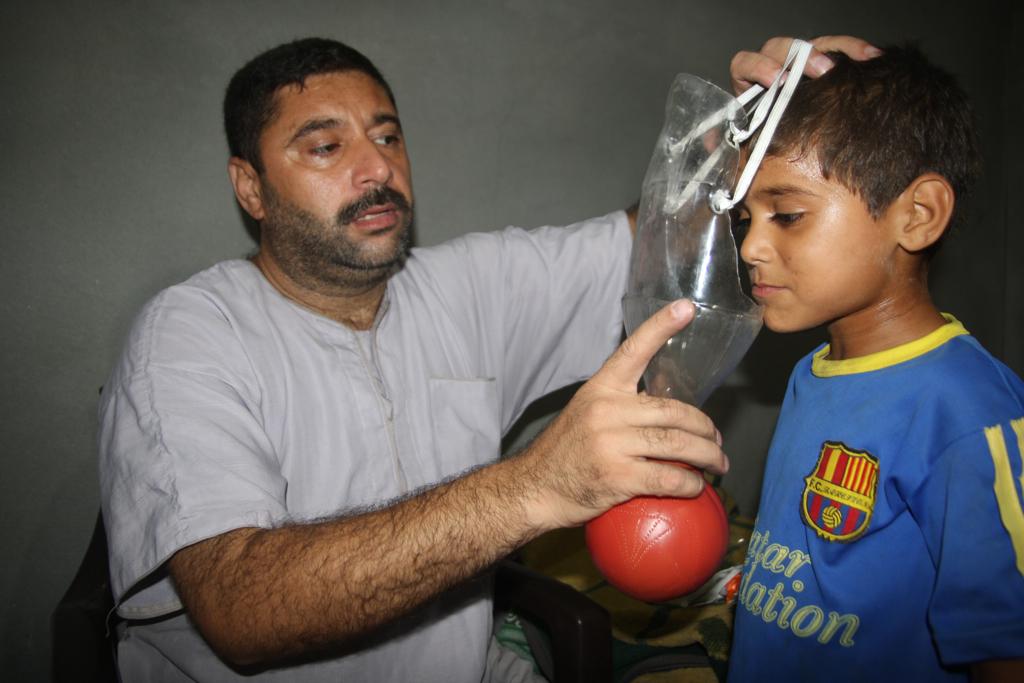In blockaded Gaza, making gas masks with jars and paper towels
Gaza resident Nafez Nayef is making homemade gas masks for his family and friends, worried that a US strike on Syria will prompt the Assad regime to hit back at Israel with chemical weapons.
GAZA CITY, Gaza Strip — When Gaza resident Nafez Nayef first heard that the United States might attack Syria — which Gazans fear will prompt a retaliatory chemical attack against neighboring Israel — he says he knew he had to get gas masks for his family right away.
But because both Israel and Egypt limit the goods that enter the Gaza Strip, a small, isolated territory on the Mediterranean, only a handful of journalists and riot police has been able to obtain masks.
So Nayef took to YouTube to figure out how to make them — convinced it was better than nothing if Syrian rockets landed near or in Gazan territory.
There was one YouTube video he preferred: a three-minute tutorial uploaded by an Al Qaeda fighter in Iraq.
“All you need is an empty, 2 liter soda bottle, paper towels, vinegar, a plastic jar and ground coal,” Nayef said.
He uses the jar as the filter, stuffing it with paper towels soaked in vinegar to absorb the gas. Opening the body of the soda bottle, he attaches it to the jar to cover the face.
“All the materials I need are available in Gaza,” he said. But still, “everything is rare here and prices are skyrocketing.”
Already isolated and struggling economically, Gaza was hit even harder when Egypt’s military ousted former president and Muslim Brotherhood leader Mohamed Morsi in July. The government that replaced Morsi partly blamed Palestinians and the Islamist Hamas movement, which controls the Gaza Strip, for some of the violence that had gripped the country.
In addition to shutting its passenger crossing with Gaza, the Egyptian military moved to close the tunnels that ferry goods under the Gaza-Egypt border.
Gaza’s Hamas-run government says Egypt has destroyed more than 90 percent of the tunnels, which are used to smuggle fuel, construction materials and other goods to the territory’s 1.7 million residents.
The head of Gaza’s chamber of commerce, Maher Attabar, says Gazans are finding it nearly impossible to buy Israeli goods — at nearly double the price.
Construction on new homes and buildings — which was booming in 2011 and 2012 — is now completely stalled as materials from Egypt are blocked. In Gaza City, residents wait for hours in long lines at gas stations for expensive Israeli fuel.
Without allies, and with an ailing economy and acute shortages, Gazans say they feel stranded in the region.
Now the specter of war — after the US threatened Syria with military strikes in the wake of a chemical weapons attack in the Damascus suburbs Aug. 21 — is making Palestinians here feel even more vulnerable.
“The unrest in Egypt has affected us badly, the problems between Hamas and Israel have made our lives unbearable. And the conflict in Syria may also affect us if the US attacks Damascus,” he said.
The likelihood of a US attack on Syria decreased in recent days, when the US and Russia announced talks to put Syria’s chemical weapons under international control.
The US had moved several naval destroyers into the Eastern Mediterranean over the past couple of weeks to ready for a strike, which President Barack Obama said would be aimed at deterring Assad from using chemical weapons.
The United Nations says more than 100,000 people have been killed so far in the two-year-long Syrian conflict, pitting the regime of Syrian President Bashar al-Assad against a largely Sunni Muslim opposition.
Hundreds died in the Aug. 21 poison gas attack on rebel-held neighborhoods outside Damascus, which the US, Human Rights Watch and other Western countries say was carried out by Assad’s forces.
"We are affected by everything happening in the region," said Mazen Maarouf, a vegetable seller from Beit Lahiya, in north Gaza.
Nayef remembers when in 1991, Iraqi dictator Saddam Hussein fired ballistic missiles at Israel after the US and other troops pushed back an Iraqi invasion of Kuwait. He also threatened to hit Israel with chemical weapons, prompting Gazans to seal their windows with plastic sheets, Nayef says.
This time, Nayef, a former policeman, is doing the same — and also making masks for his friends and other relatives.
![]()
Gaza resident Nafez Nayef is making homemade gas masks for his family and friends, worried that a US strike on Syria will prompt the Assad regime to hit back at Israel with chemical weapons. Ahmed Aldabba/GlobalPost
Nayef’s brother, 35-year-old Nael, says he is less worried about a chemical attack from Syria that eventually reaches Gaza.
He says it’s more likely that Palestinian militant groups like Islamic Jihad — which have strong ties to Syria’s main patron, Iran — would fire rockets at Israel to avenge a US strike against Assad.
Israel could respond to the rockets by launching another offensive on Gaza. And Nael says he is worried Israel could use white phosphorus on Gaza like it did in the 2008-2009 war here, Operation Cast Lead. White phosphorus is used in incendiary munitions and produces an instant blanket of smoke. International law prohibits its use on civilian areas.
"It's protective enough,” Nael, an unemployed car mechanic, said of his mask. “It’s better than having nothing at all.”
At Nayef’s house, he is preparing for chemical war, but there are also more pressing concerns.
Right now, Gaza’s power is out for roughly 12 hours each day — and Nayef has eight children to take care of.
"I can barely get fuel for my generator,” he said.
We want to hear your feedback so we can keep improving our website, theworld.org. Please fill out this quick survey and let us know your thoughts (your answers will be anonymous). Thanks for your time!
